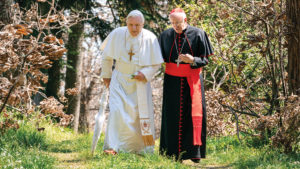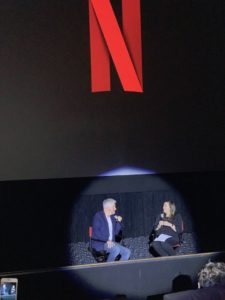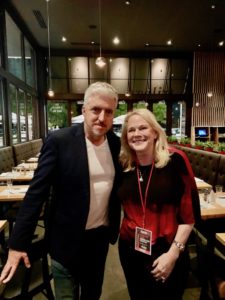Anthony McCarten says, “Finding a Consensus and a Common Ground is the Real Message of The Two Popes“

I spoke with Anthony McCarten screenwriter of “The Two Popes,” after a screening of the film at Film Fest919 in Chapel Hill, North Carolina, on October 12, 2019, we met in the lobby of the Silverspot Cinema Theater. McCarten is no stranger to writing fact-based award-winning films that have recently garnered Best Actor awards for Eddie Redmayne in “The Theory of Everything” (2014), Gary Oldman in “The Darkest Hour” (2017), and Rami Malek in “Bohemian Rhapsody” (2018).

“The Two Popes,” tells the story of a rare occurrence, it’s been nearly 700 years that a pope, Pope Benedict, (Sir Anthony Hopkins) has resigned instead of serving until death. This circumstance opened the gate to support, encourage, and choose his successor, Pope Francis (Jonathan Pryce), as the first pope from the Americas.
McCarten states, “I wasn’t trying to take a view or take a stance. My interest was in to having a debate, a dialectic between the progressive camp and the conservative camp. I wanted the film to speak to the broader conversation in society at large. Where the debate has rather degenerated between the conservatives and the progressives. There’s a lot of anger, causing the middle, of which has seemed to collapsed. If we are to make any progress at all, we have to reclaim the high ground or the middle.”

Sarah Knight Adamson:
First of all, your movie is so heartwarming and spiritual. I had all of those good feelings about it, I’m Protestant, but I have so many Catholic friends. I’ve been to Rome three times, which I’m fortunate to have been in the Vatican; and, I love going to the Vatican. I appreciate all aspects of it especially the art and the history. I can’t even imagine beginning to write the script as you’d need help from inside of the Vatican. Can you please speak about your research?
Anthony McCarten:
Once we started to get into making the movie, we interviewed a lot of experts. So, we had experts on the Conclave, the Vatican experts who swore us to confidential disclosure agreements. But then they were quite open about saying, “Well, maybe you can dramatize that. Here’s a photograph of what we do in the room.” So, it became very, very accurate. More accurate than we hoped initially.
When it came to writing the dialog, I had to do a lot of research into the writings and interviews between the two Popes, so that I could capture their opinions, but also the sound of their voice. Not just what they said, but how they would say it. That was important.
SKA: And how did you do that? Where would you find that?
AM: You can find it online. I got a lot of information translated out from German to English. That was available on Benedict in the German language, but not the English. There’s a lot of information in South American, in Spanish that I translated from Francis. There are also many books been written on both people by now.
SKA: How long did it take you to write the script?
AM: I like to work quickly, so the writing came fast, but the reading is the difficult process. Reading all the research. A lot of the information that was interesting was in Latin, and I needed to have that transcribed as well.
SKA: What surprised you in your research?
AM: I thought I’d known about Francis and his past. So, I learned a lot about that, which surprised and amazed me. His journey from quite an authoritarian figure. Not famous for his humor when he was younger, to the man we know today. The man of the people with a smile on his face. Quick with a laugh. It seemed to be quite an evolution. The more I researched how he was and how he is now. I saw quite a dramatic arc in his personality, which as a dramatist, I found fascinating.
And then with Benedict, there’s a similar arc from a guy that was liberal at the beginning of his career, became conservative after the student revolutions of 1968. He was shocked by what he thought were dangers of liberalism and became quite an arch conservative. But his resignation speaks to the transformation in him. Because he had to have been aware that his resignation would possibly allow the election of Francis, it was from second to him at the last Conclave. That marked another stage in his evolution. There are very pronounced arcs in both men.
SKA: I learned so much history from the film; it was really great. The part, obviously, you found it in your research, that the one Pope did question, what about the priests and the abuse and if this priest was aware. Did you find that in your research that that conversation may have happened? Or did you just want to bring it out in the movie?
AM: They both have very publicly well-known positions on sexual abuse, and where they both think the origins of that abuse came from. And they differ.
SKA: Interesting, they differ?
AM: Yes, they differ. So that was just grist of the mill for me to dramatize. To show where they lay the blame. They lay the blame in different places. When you’ve got Benedict, he lays the blame at the permissiveness of the late 1960s. And Francis is much more taking full responsibility for the blame on the church; that there were problems in the church.
SKA: Interesting. Thank you for including that in the movie.
AM: It’s kind of the elephant in the room. So I felt I had to, but I wasn’t wanting this to be some sort of Spanish Inquisition of the Catholic Church. It was more not about the church’s past but more about the church’s future in showing two people charged with controlling its spiritual destiny, and finding out what their vision was for the future for this church. Because I think that the world’s in a position now, where we’re asking is the progressive agenda or the conservative agenda the most likely to ensure our best future? We’re not sure. We’re very divided; even homes are divided on that question. And, it’s with the view of finding a consensus and a common ground that is the real message in this film.
SKA: So, Anthony Hopkins, did you have him in mind at all when you were writing?
AM: I did, yeah. When I went in to pitch this movie to Netflix, I took with me two photographs of two actors. One was of Anthony Hopkins and one of Jonathan Pryce. Neither actor knew that I was taking their photograph. And I said these are the two people I’d like to be in this movie. And it’s never happened to me before, where you’ve got the people you wish, but it was God sent that both responded, and both agreed to be in it.

“The Two Popes” is available on Netflix.
Sarah Knight Adamson© December 30, 2019
